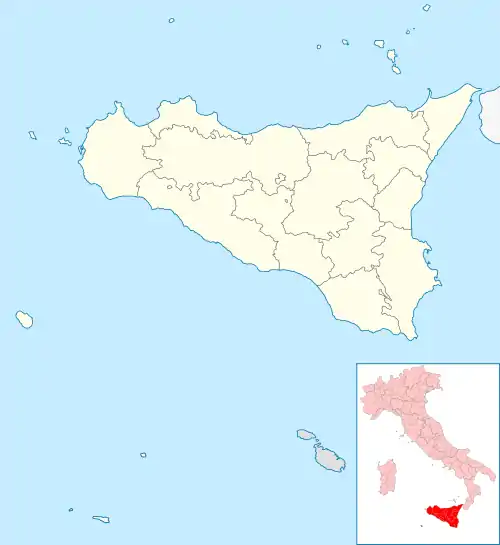Drepana
Drepana (Ancient Greek: Δρέπανα) was an Elymian, Carthaginian, and Roman port in antiquity on the western coast of Sicily. It was the site of a crushing Roman defeat by the Carthaginians in 249 BC. It eventually developed into the modern Italian city of Trapani.
Drepana | |
|---|---|
| Drepana (modern-day Trapani) | |
Location of Drepana | |
 Drepana Location of Drepana in Italy  Drepana Drepana (Sicily) | |
| Coordinates: 38°00′54″N 12°30′45″E | |
| Country | Italy |
| Region | Sicily |
| Province | Trapani (TP) |
| Elevation | 3 m (10 ft) |
| Time zone | UTC+1 (CET) |
| • Summer (DST) | UTC+2 (CEST) |
Name
Drepana received its name from drépanon (δρέπανον), the Greek word for "sickle", because of the curving shape of its harbour.[1] This was Latinized as Drepanum before being pluralized to its present form.
History

The town was founded by the Elymians to serve as the port of the nearby city of Eryx (present-day Erice), which overlooks it from Monte Erice. The city sits on a low-lying promontory jutting out into the Mediterranean Sea. The town, 40 km (25 mi) north of Lilybaeum, had been fortified by the Carthaginians, who resettled part of the population to Eryx. In 241, it was besieged by G. Lutatius Catulus.[2] and later used as a naval base.
The town features in the Aeneid as the site of the death and funeral games of Anchises.[1]
Carthage seized control of the city in 260 BC, subsequently making it an important naval base. The naval battle of Drepanum took place in 249 BC and was a major victory for Carthage against the Roman Republic in the First Punic War. After the Battle of the Aegates and Carthage's loss of the war, the town was ceded to Roman control in 241 BC.
It never achieved the status of a civitas in Roman times.
See also
References
- Smith, William, ed. (1878). A Dictionary of Greek and Roman Geography, vol.1. London: John Murray. p. 788. Archived from the original on September 1, 2021. Retrieved Aug 27, 2018.
- Dillon, Matthew; Garland, Lynda (2005). Ancient Rome: From the Early Republic to the Assassination of Julius Caesar. London: Routledge. p. 190. ISBN 0-415-22458-6. Archived from the original on 2021-09-01. Retrieved 2022-02-26.

